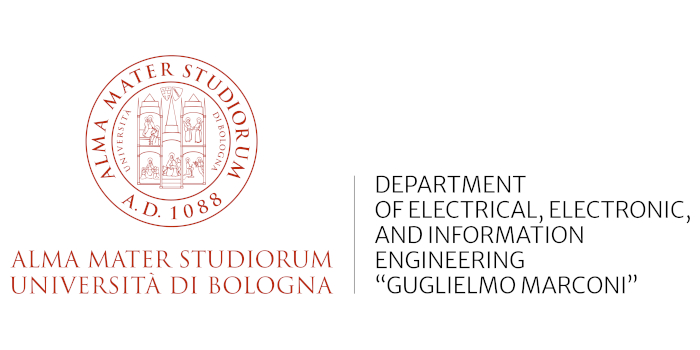SPECIAL SESSION #3
The Smart Battery Cell: Sensors, Modeling, Diagnostics and Characterization for the Next Generation Batteries
ORGANIZED BY
Valentina Bianchi
University of Parma, Department of Engineering and Architecture, Italy
Roberta Ramilli
University of Bologna, Department of Electrical, Electronic, and Information Engineering "Guglielmo Marconi", Italy
Alessio De Angelis
University of Perugia, Department of Engineering, Italy
Ilaria De Munari
University of Parma, Department of Engineering and Architecture, Italy
ABSTRACT
Batteries are a key technology to foster the challenging and ambitious European Green Deal for the sustainable economy of the future. Climate neutrality, resource efficiency, circular and clean economy are the main targets to achieve the overall objectives: no net emissions of greenhouse gases within 2050 and decoupling of social and economic growth from resource exploitation. In this context, the management of batteries in order to extend their lifespan and improve waste management strategies is fundamental, as evidenced by a recent regulation approved by the European Parliament.
In this framework, the contribution of the automotive sector to the shift towards a sustainable and smart mobility that is envisaged by the Green Deal plays a paramount role. A step increase of the demand and diffusion of efficient, affordable, and safe battery electric vehicles (BEVs), hybrid electric vehicles (HEVs) and plug-in hybrid electric vehicles (PHEVs), which are essential towards a low-emission transport system, can be part of the response to this challenge, but it can be achieved only if the novel “Smart” Battery Cell paradigm is adopted.
More precisely, the single battery cell must go beyond its traditional functionalities and evolve into a Cyber-Physical System (CPS), autonomously capable of collecting in real-time, and in-operando, multi-parameter information (e.g., besides typical electrical parameters, also the time-evolution of the electrochemical impedance spectrum, of the internal and external distributed strain and temperature, of quantities related to physical/chemical degradation phenomena, etc.). Such cell-level information needs to be processed and transduced into battery module/cell state parameters by means of suitable algorithms and predictive models implemented either locally, and/or at the Battery Management System (BMS) level, or even in the cloud. Digital signal processing techniques or Artificial Intelligence algorithms can be applied considering the available measured data, computational resources and particular application requirements. State parameters are thus exploited by the BMS control for improving the performance, safety, and lifetime of the battery. Scientific research and industrial innovation in sensor design and integration, modeling, diagnostics, communication, as well as in related characterization techniques are strongly needed for advancing the battery technology towards the new disruptive paradigm.
TOPICS
Topics of interest for this Special Session include, but are not limited to:
- Design, implementation, and characterization of sensing strategies and sensors for automotive battery modules/cells;
- Electrochemical impedance spectroscopy and other electrical sensors for batteries;
- Thermo-mechanical and chemical sensors for batteries;
- Design of efficient excitation signals for accurate, fast, and low-noise sensing on batteries;
- Ageing and degradation models;
- Physics- and data-based models;
- Battery module/cell state estimators from multi-parameter sensing;
- In-operando monitoring technologies for battery cell self-healing and second-life usage;
- Fault analysis;
- Predictive maintenance;
- Innovative battery management systems (BMS);
- Advanced algorithms data-driven and/or model-based for battery control and monitoring of the state of charge (SOC), state of health (SOH), battery remaining useful life (RUL), etc. and their metrological characterization;
- Battery diagnostic;
- Sensing methods to improve battery performance and BMS’s operation;
- Battery balancing techniques;
- Innovative methods to measure the key battery parameters.
ABOUT THE ORGANIZERS
Valentina Bianchi (Senior Member, IEEE) received the B.Sc. and M.Sc. degrees in electronic engineering and the Ph.D. degree from the Department of Information Engineering, University of Parma, Parma, Italy, in 2003, 2006, and 2010, respectively. She is currently a Research Associate with the Department of Information Engineering, University of Parma. She has participated in several national and international projects. She has authored or coauthored over 50 papers in international journals or proceedings of conferences. Her current research interests include the design and validation of sensors for human activity recognition and for electrochemical and agrifood applications. Moreover, she is involved in designing digital systems implemented on field programmable gate arrays (FPGAs), with a special focus on the design of hardware for machine learning algorithms and arithmetic circuits applied also to the evaluation of the batteries State of Charge.
Dr. Bianchi is an Associate Editor of the IEEE TRANSACTIONS ON INSTRUMENTATION AND MEASUREMENT.
Roberta Ramilli received the M.S. degree in biomedical engineering from the University of Bologna, Bologna, Italy, in 2017. From 2017 to 2021, she joined the Advanced Research Centre for Electronic Systems (ARCES), University of Bologna, where she worked as a Research Assistant. She is currently pursuing the Ph.D. degree in biomedical, electrical and systems engineering. Her research focuses on techniques and technologies for impedance measurements, with particular interest on battery instrumentation and measurement.
Alessio De Angelis obtained the PhD degree in Information Engineering in 2009 from the University of Perugia, Italy. From 2010 to 2013 he was a researcher with the Signal Processing Lab, KTH Royal Institute of Technology, Stockholm, Sweden. Since July 2013 he has been with the Department of Engineering of the University of Perugia, Italy, where he became an Associate Professor in May 2018. Since 2019, he has been an Associate Editor for IEEE Transactions on Instrumentation and Measurement. His current research interests include instrumentation and measurement, positioning systems, and battery measurement and modeling.
Ilaria De Munari (Senior Member, IEEE) received the M.Sc. degree in electronic engineering and the Ph.D. degree in information technologies from the University of Parma, Parma, Italy, in 1991 and 1995, respectively. In 1997, she joined the Department of Information Engineering (now Department of Engineering and Architecture), University of Parma, as a Research Assistant, where she has been an Associate Professor of electronics since 2004. She has authored or coauthored more than 100 papers in technical journals or proceedings of international conferences. Her past research interests include the reliability of electronic devices and the design of electronic systems for active assisted living. In this framework, she was involved in several European projects. Her current research interests include the design of digital systems based on microcontrollers and field-programmable gate arrays (FPGAs). In particular, she is dealing with the design of sensors for human activity recognition, electrochemical applications, and the evaluation of the battery state of charge through machine learning algorithms; moreover, she dealt with the FPGA implementation of arithmetic circuits and error correction code techniques.
Prof. De Munari is an Associate Editor of the journal IEEE ACCESS.















